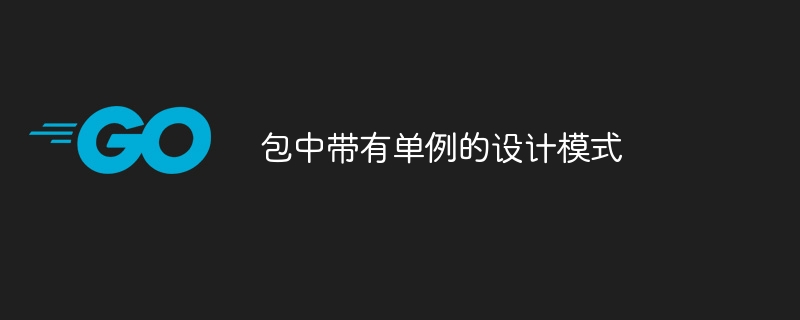Design pattern with singleton in package

php editor Apple is here to introduce to you a commonly used design pattern - the design pattern with a singleton. In software development, the singleton pattern is widely used, which ensures that a class has only one instance and provides a global access point. This design pattern can improve code reusability and performance, while also avoiding some potential problems. When using this design pattern, you need to pay attention to details such as thread safety and lazy loading to ensure the correctness and reliability of the implementation.
Question content
I am still not a golang expert and trying to understand and learn best practices
How to initialize a singleton in a package and make it thread-safe so that even if the package is imported multiple times in different files, there will only be one instance
Now the instance sessions is started in main, but then I have to pass it. How do I start an instance of sessions inside the sess package and make it a global variable or something else inside the package?
I hope it is a private variable within the sess package
package main
func main(){
sessions := sess.Init()
}sessmodule
package sess
import (
"sync"
"time"
)
type pool struct {
lock sync.RWMutex
sessions map[string]*session
}
func Init() *pool {
p := &pool{
sessions: map[string]*session{},
}
return p
}
func (p *pool) Set(sid string, s *session){
p.lock.Lock()
defer p.lock.Unlock()
p.sessions[sid] = s
}
func (p *pool) Get(sid string) (*session, bool){
p.lock.RLock()
defer p.lock.RUnlock()
s, ok := p.sessions[sid]
return s, ok
}Solution
Use a singleton to declare and initialize the exported package-level variables. There is an initialization instance for each package-level variable, rather than an instance or initialization for each import.
package sess
import (
"sync"
"time"
)
type pool struct {
lock sync.RWMutex
sessions map[string]*session
}
var Pool = &pool{sessions: map[string]*session{}}
func (p *pool) Set(sid string, s *session){
p.lock.Lock()
defer p.lock.Unlock()
p.sessions[sid] = s
}
func (p *pool) Get(sid string) (*session, bool){
p.lock.RLock()
defer p.lock.RUnlock()
s, ok := p.sessions[sid]
return s, ok
}The above is the detailed content of Design pattern with singleton in package. For more information, please follow other related articles on the PHP Chinese website!

Hot AI Tools

Undresser.AI Undress
AI-powered app for creating realistic nude photos

AI Clothes Remover
Online AI tool for removing clothes from photos.

Undress AI Tool
Undress images for free

Clothoff.io
AI clothes remover

Video Face Swap
Swap faces in any video effortlessly with our completely free AI face swap tool!

Hot Article

Hot Tools

Notepad++7.3.1
Easy-to-use and free code editor

SublimeText3 Chinese version
Chinese version, very easy to use

Zend Studio 13.0.1
Powerful PHP integrated development environment

Dreamweaver CS6
Visual web development tools

SublimeText3 Mac version
God-level code editing software (SublimeText3)

Hot Topics
 1676
1676
 14
14
 1429
1429
 52
52
 1333
1333
 25
25
 1278
1278
 29
29
 1257
1257
 24
24
 Golang vs. Python: Performance and Scalability
Apr 19, 2025 am 12:18 AM
Golang vs. Python: Performance and Scalability
Apr 19, 2025 am 12:18 AM
Golang is better than Python in terms of performance and scalability. 1) Golang's compilation-type characteristics and efficient concurrency model make it perform well in high concurrency scenarios. 2) Python, as an interpreted language, executes slowly, but can optimize performance through tools such as Cython.
 Golang and C : Concurrency vs. Raw Speed
Apr 21, 2025 am 12:16 AM
Golang and C : Concurrency vs. Raw Speed
Apr 21, 2025 am 12:16 AM
Golang is better than C in concurrency, while C is better than Golang in raw speed. 1) Golang achieves efficient concurrency through goroutine and channel, which is suitable for handling a large number of concurrent tasks. 2)C Through compiler optimization and standard library, it provides high performance close to hardware, suitable for applications that require extreme optimization.
 Getting Started with Go: A Beginner's Guide
Apr 26, 2025 am 12:21 AM
Getting Started with Go: A Beginner's Guide
Apr 26, 2025 am 12:21 AM
Goisidealforbeginnersandsuitableforcloudandnetworkservicesduetoitssimplicity,efficiency,andconcurrencyfeatures.1)InstallGofromtheofficialwebsiteandverifywith'goversion'.2)Createandrunyourfirstprogramwith'gorunhello.go'.3)Exploreconcurrencyusinggorout
 Golang vs. C : Performance and Speed Comparison
Apr 21, 2025 am 12:13 AM
Golang vs. C : Performance and Speed Comparison
Apr 21, 2025 am 12:13 AM
Golang is suitable for rapid development and concurrent scenarios, and C is suitable for scenarios where extreme performance and low-level control are required. 1) Golang improves performance through garbage collection and concurrency mechanisms, and is suitable for high-concurrency Web service development. 2) C achieves the ultimate performance through manual memory management and compiler optimization, and is suitable for embedded system development.
 Golang vs. Python: Key Differences and Similarities
Apr 17, 2025 am 12:15 AM
Golang vs. Python: Key Differences and Similarities
Apr 17, 2025 am 12:15 AM
Golang and Python each have their own advantages: Golang is suitable for high performance and concurrent programming, while Python is suitable for data science and web development. Golang is known for its concurrency model and efficient performance, while Python is known for its concise syntax and rich library ecosystem.
 Golang and C : The Trade-offs in Performance
Apr 17, 2025 am 12:18 AM
Golang and C : The Trade-offs in Performance
Apr 17, 2025 am 12:18 AM
The performance differences between Golang and C are mainly reflected in memory management, compilation optimization and runtime efficiency. 1) Golang's garbage collection mechanism is convenient but may affect performance, 2) C's manual memory management and compiler optimization are more efficient in recursive computing.
 The Performance Race: Golang vs. C
Apr 16, 2025 am 12:07 AM
The Performance Race: Golang vs. C
Apr 16, 2025 am 12:07 AM
Golang and C each have their own advantages in performance competitions: 1) Golang is suitable for high concurrency and rapid development, and 2) C provides higher performance and fine-grained control. The selection should be based on project requirements and team technology stack.
 Golang vs. Python: The Pros and Cons
Apr 21, 2025 am 12:17 AM
Golang vs. Python: The Pros and Cons
Apr 21, 2025 am 12:17 AM
Golangisidealforbuildingscalablesystemsduetoitsefficiencyandconcurrency,whilePythonexcelsinquickscriptinganddataanalysisduetoitssimplicityandvastecosystem.Golang'sdesignencouragesclean,readablecodeanditsgoroutinesenableefficientconcurrentoperations,t




